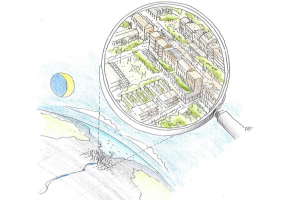
Humanity is facing not one but three intertwined crises: the COVID-19 pandemic, climate change, and a lack of adequate and affordable housing. Each of these three emergencies has the potential to compound the multidimensional impacts of the others in health, social cohesion, environmental integrity and economic vitality, and therefore demands coordinated and urgent action. The Regional Action Plan endorsed today by UNECE member States Place and Life in the UNECE: Regional Action Plan 2030 identifies specific actions to tackle challenges from the COVID-19 pandemic, climate and housing emergencies in the region, city, neighbourhood and home.
The Regional Action Plan identifies policy propositions, targets and actions to assist governments and cities of UNECE member States in addressing the difficulties brought about by the COVID-19 pandemic for an already stretched affordable housing system across the region. It aims to tackle inequalities, strengthen the capacities of local actors, and pursue a green, resilient and inclusive economic recovery by focusing on two policy areas:
-
cities, neighbourhoods, homes and rural life
-
sustainable housing and homes.
A series of aims, policies, goals and targets for sustainable urban development and affordable housing in the UNECE region are proposed in the Regional Action Plan along with a series of actions to achieve these. For instance, the goal “Sustainable neighbourhoods and local living environments” is accompanied by the target of publishing research guidance on the size, composition, population, services and environment of sustainable neighbourhoods. One of the actions suggested to address this target is to provide universal access to safe, inclusive and accessible, green and public spaces, particularly for disadvantaged population groups.
The provision of housing is a resource-intensive exercise with consequences on Green-House-Gas emissions, and therefore requires the engagement of governments and civil society, as well as action by UNECE and other international organizations. The overall aim of the Regional Action Plan is to establish the necessary institutional conditions to develop and strengthen these components and thereby achieve a sustainable and progressive transformation towards sustainable housing and urban development.
UNECE Executive Secretary, Olga Algayarova stated that “The Regional Action Plan is a powerful document which provides us with clear priorities towards making housing in the UNECE region more affordable, decent, accessible and climate neutral for all and integrating housing policies with urban development policies by national as well as city governments”.
In his address to this week’s UNECE Ministerial Meeting on Urban Development, Housing and Land Management, Mr. Rajagopal Balakrishnan, Special Rapporteur on the right to adequate housing, stated that “the COVID-19 pandemic has put equal and non-discriminatory enjoyment of the right to adequate housing under extreme pressure. Housing is not only about good public policies, but a value reorientation, as housing is a fundamental human right. I hope that the unique and multiple challenges of our time from COVID-19, climate change and migration, will force us to change our values and to fully realize housing as a human right. I hope that by adopting at this meeting, a regional action plan to tackle the challenges of the COVID-19 pandemic, climate and housing emergencies, a small but important step can be taken to ensure that we all live up to the obligation to make sure that everyone can find a home to live in that provides security and dignity.”
The Regional Action Plan builds on key principles of various global documents, including the 2030 Agenda for Sustainable Development, the Paris Agreement, the Geneva UN Charter on Sustainable Housing and others. The mandate for the preparation of the Regional Action Plan was given to UNECE at the 81st session of the UNECE Committee of Urban Development, Housing and Land Management in October 2020.
The Regional Action Plan was created with the support of the Glasgow Urban Lab, a UNECE Centre of Excellence which operates as a partnership between The Glasgow School of Art and Glasgow City Council for capacity building on sustainable urban development.
The Regional Action Plan was illustrated by the international award-winning architect, Lord Foster, President of the Norman Foster Foundation. His sketches present a vision of city planning that incorporate concepts of sustainable urban development and innovation such as energy efficient housing, sensitivity to local culture and values, the upgrading of informal settlements and access to green areas. The Norman Foster Foundation cooperates with UNECE as a Centre of Excellence on the promotion of sustainable housing and cities.